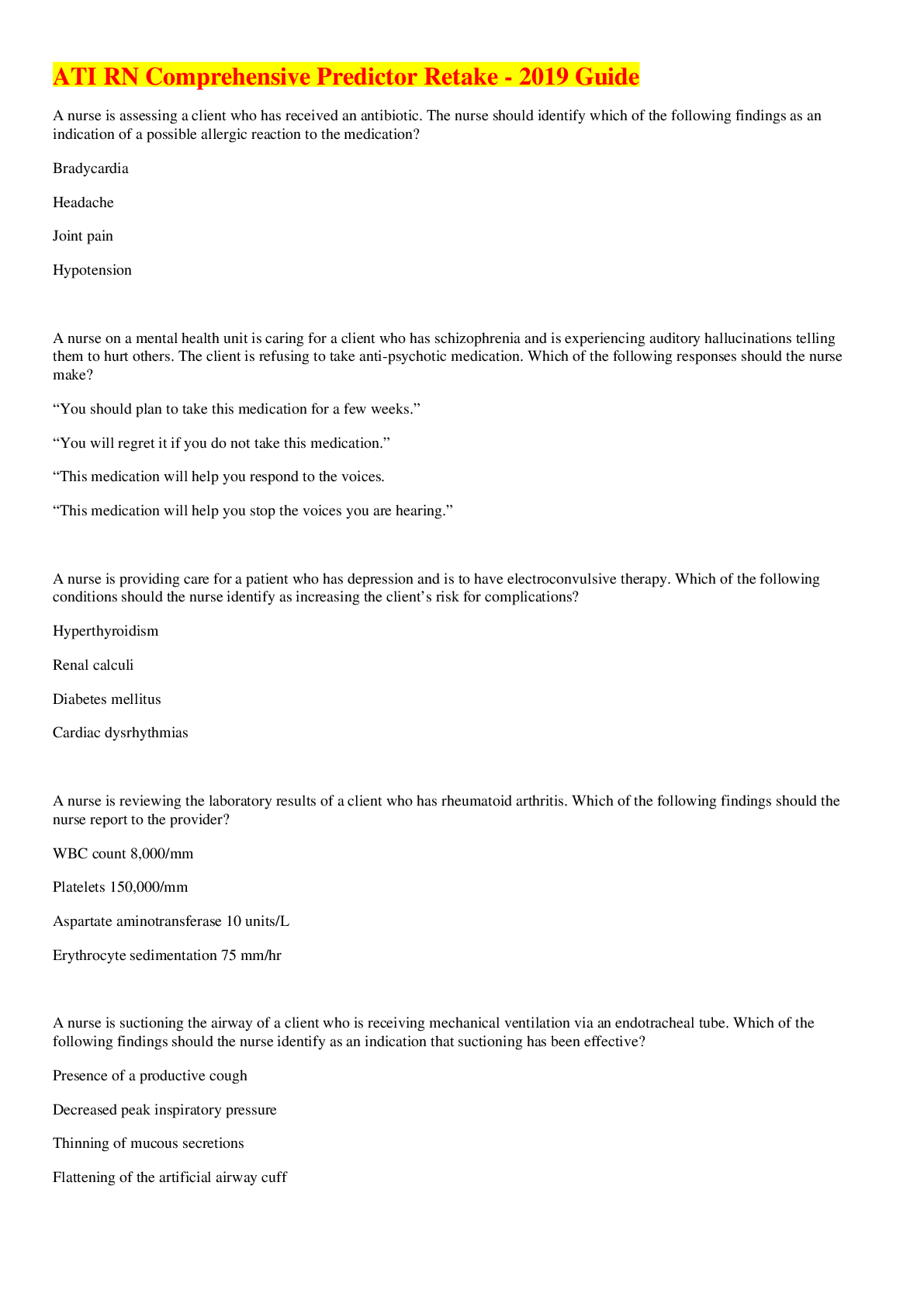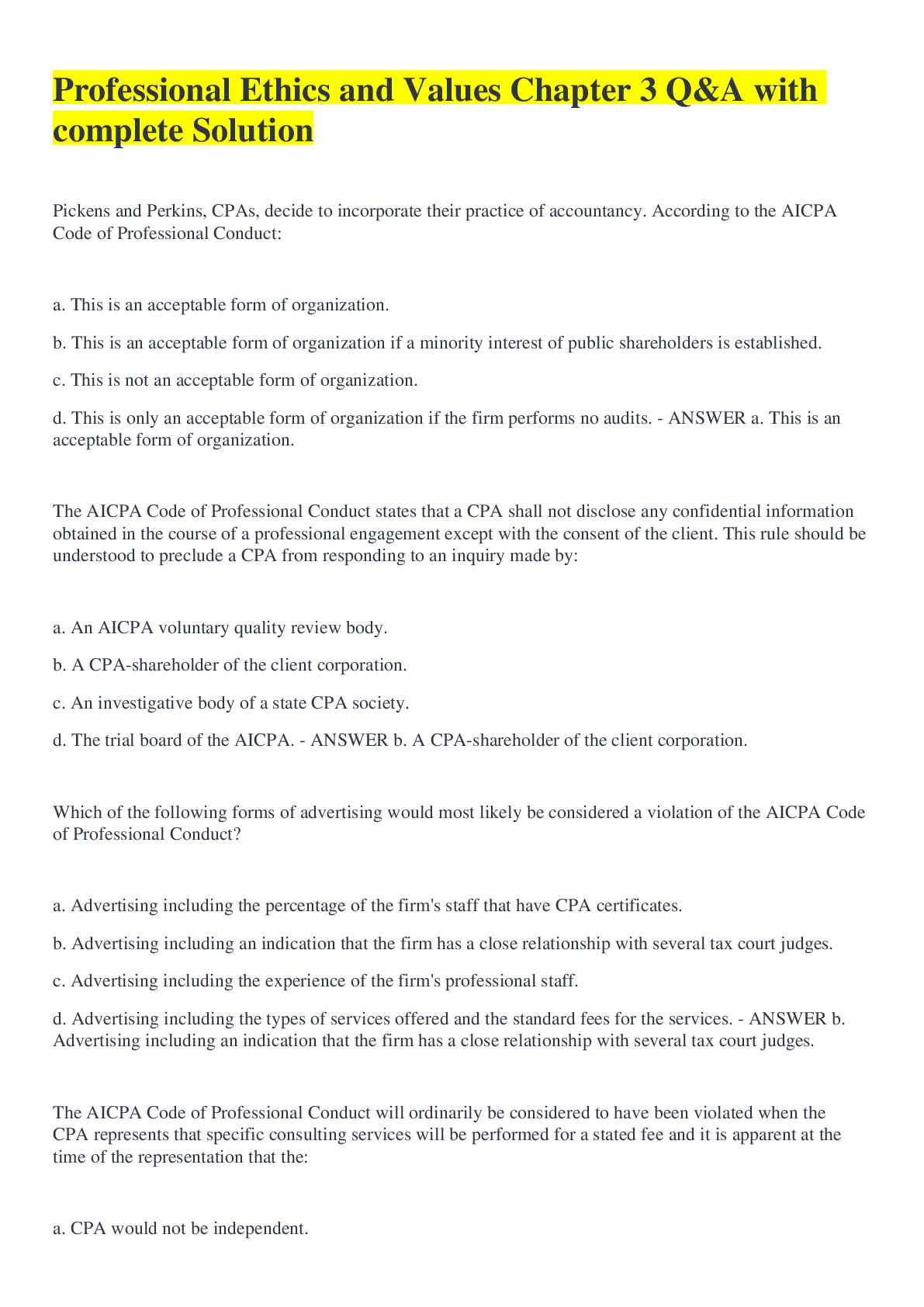Pickens and Perkins, CPAs, decide to incorporate their practice of accountancy. According to the AICPA Code of Professional Conduct:
a. This is an acceptable form of organization.
b. This is an acceptable form of org
...
Pickens and Perkins, CPAs, decide to incorporate their practice of accountancy. According to the AICPA Code of Professional Conduct:
a. This is an acceptable form of organization.
b. This is an acceptable form of organization if a minority interest of public shareholders is established.
c. This is not an acceptable form of organization.
d. This is only an acceptable form of organization if the firm performs no audits. - ANSWER a. This is an acceptable form of organization.
The AICPA Code of Professional Conduct states that a CPA shall not disclose any confidential information obtained in the course of a professional engagement except with the consent of the client. This rule should be understood to preclude a CPA from responding to an inquiry made by:
a. An AICPA voluntary quality review body.
b. A CPA-shareholder of the client corporation.
c. An investigative body of a state CPA society.
d. The trial board of the AICPA. - ANSWER b. A CPA-shareholder of the client corporation.
Which of the following forms of advertising would most likely be considered a violation of the AICPA Code of Professional Conduct?
a. Advertising including the percentage of the firm's staff that have CPA certificates.
b. Advertising including an indication that the firm has a close relationship with several tax court judges.
c. Advertising including the experience of the firm's professional staff.
d. Advertising including the types of services offered and the standard fees for the services. - ANSWER b. Advertising including an indication that the firm has a close relationship with several tax court judges.
The AICPA Code of Professional Conduct will ordinarily be considered to have been violated when the CPA represents that specific consulting services will be performed for a stated fee and it is apparent at the time of the representation that the:
a. CPA would not be independent.
b. Fee was a competitive bid.
c. There was a referral fee that was not disclosed to the client.
d. Actual fee would be substantially lower than the fees charged by other CPAs for comparable services. - ANSWER c. There was a referral fee that was not disclosed to the client.
Which of the following acts by a CPA would most likely be considered a violation of the AICPA Code of Professional Conduct?
a. A "covered member" owns an immaterial amount of stock in an audit client.
b. Assisting a client in preparing a financial forecast.
c. Forming a professional corporation to practice as a CPA.
d. Accepting a fee in a tax matter relating to an administrative proceeding. - ANSWER a. A "covered member" owns an immaterial amount of stock in an audit client.
Which of the following is least likely to be considered an act discreditable to the accounting profession?
a. Knowingly disclosing CPA exam questions.
b. Failure to comply with federal laws regarding the filing of tax returns.
c. Refusing to provide the client with copies of working papers the client prepared for the auditor.
d. Disclosing confidential client information. - ANSWER c. Refusing to provide the client with copies of working papers the client prepared for the auditor.
A CPA's retention of client records as a means of enforcing payment of an overdue audit fee is an action that is:
a. It is advised since it would impair the CPA's independence with respect to the client.
b. Considered discreditable to the profession.
c. Considered acceptable by the AICPA Code of Professional Conduct.
d. A violation of generally accepted auditing standards. - ANSWER b. Considered discreditable to the profession
Competence as a certified public accountant includes all of the following except:
a. Guaranteeing the accuracy of the work performed.
b. Consulting others if additional technical information is needed.
c. Having the technical qualifications to perform an engagement.
d. Possessing the ability to supervise and to evaluate the quality of staff work. - ANSWER a. Guaranteeing the accuracy of the work performed.
Contingency fee-based pricing of accounting services is:
a. Considered an act discreditable to the profession.
b. Prohibited for clients for whom attestation services are provided.
c. Always strictly prohibited in public accounting practice.
d. Never restricted in public accounting practice. - ANSWER b. Prohibited for clients for whom attestation services are provided.
Which of the following statements is correct?
a. Working papers prepared by the auditor solely for the engagement need not be returned to the client.
b. Client prepared records (e.g., the general ledger) may be retained by the CPA until fees due to the CPA are received.
c. CPA working papers that include copies of client's records are not available to third parties under any circumstances.
d. CPA working papers are the joint property of the CPA and the client. - ANSWER a. Working papers prepared by the auditor solely for the engagement need not be returned to the client.
[Show More]


